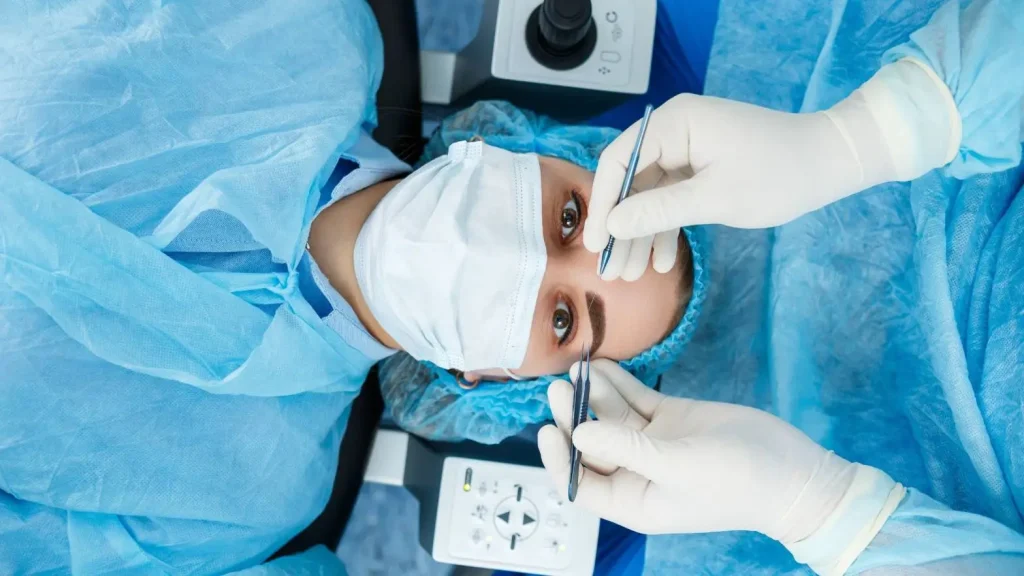How to Prevent Infections After Eye Surgery?
Eye surgery, whether for conditions like cataracts, glaucoma, or retinal issues, can dramatically improve your vision and quality of life. However, the healing process doesn’t end in the operating room. Preventing infections after eye surgery is a crucial part of your recovery.
Following proper care instructions not only safeguards your vision but also ensures a smoother healing experience. This guide provides all the details you need to minimize infection risks after eye surgery.

AUTHOR
Ophthalmologist/ Eye Surgeon 13+ Years Exp
MBBS, MS – Ophthalmology
TSMC- TSMC/FMR/05251 (2018)
CONDITION
CALL US 24/7 FOR ANY HELP
GET IN TOUCH ON
Why Infection Prevention is Critical After Eye Surgery?
Your eyes are particularly vulnerable to infections during the recovery period. Even minor infections can delay healing, and severe infections like endophthalmitis can threaten your vision or require emergency surgery.
Several factors contribute to infection risks, such as bacteria introduced during surgery, improper care of the surgical site, and failure to follow post-operative guidelines.
By adhering to your doctor’s instructions and maintaining excellent ocular hygiene, you can significantly lower the risk of complications.
⇒Key Reasons for Infection Prevention:
- Preserve Your Vision: Untreated infections can lead to permanent damage or vision loss.
- Reduce Unnecessary Costs: Additional treatments, medications, or surgeries triggered by infections can lead to higher expenses.
- Shorten Recovery Time: Avoiding infections ensures faster healing, allowing you to resume normal activities sooner.
Common Types of Eye Surgery Infections and Symptoms
Understanding potential infections and their symptoms will help you act quickly if problems arise.
1. Endophthalmitis (Severe Internal Eye Infection)
- Caused By: Bacteria or fungi entering the eye during surgery.
- Symptoms: Severe eye pain, redness, discharge, blurry vision, sensitivity to light, or vision loss.
2. Keratitis (Corneal Infection)
- Caused By: Bacteria, viruses, or fungi.
- Symptoms: Redness, excessive tearing, eye discomfort, blurry vision, and hypersensitivity to light.
3. Conjunctivitis (Pink Eye)
- Caused By: Bacterial or viral contamination.
- Symptoms: Red, irritated eyes, swelling, and discharge (often yellow or green).
When to Contact Your Doctor:
If you notice persistent pain, increasing redness, or impaired vision post-surgery, consult your eye specialist immediately.
Pre-Surgery Preparation to Minimize Infection Risks
Taking steps before surgery can significantly reduce the chances of infections.
⇒General Pre-Surgery Tips:
- Eye Cleaning: Your surgeon may ask you to use antiseptic drops or clean your eyelids to reduce bacteria.
- Manage Existing Conditions: Control diabetes, dry eye, or any other chronic conditions that could affect recovery.
- Avoid Makeup or Lotions: On the day of surgery, arrive with a clean face to avoid introducing external irritants.
- Sterilization of Equipment: Trust your doctor to use sterilized tools, including for eye injections or other procedures.
⇒Protect Physical Health:
- Boost your immune system with a balanced diet.
- Stay hydrated.
- Avoid contact with sick individuals to minimize your exposure to bacteria or viruses.
By preparing before surgery, you build a strong foundation for successful healing.
Post-Surgery Care Tips to Avoid Infection
After surgery, careful day-to-day management of your eyes is key to avoiding infections. Below are specific steps to ensure safe recovery.
1. Maintain Hygiene
- Hand Washing: Always wash your hands before touching your eyes, applying drops, or managing surgical dressings.
- Avoid Rubbing Eyes: This minimizes the risk of introducing bacteria.
2. Use Prescribed Medications
- Follow instructions for antibiotic or anti-inflammatory drops to prevent bacterial growth and reduce swelling.
- Use artificial tears for dry eye to soothe the corneal surface.
3. Eye Protection
- Wear an Eye Shield: Especially at night to prevent accidental rubbing or pressure to the surgical site.
- Sunglasses: Protect your eyes from sunlight and wind, which can introduce irritants.
4. Monitor Diet and Physical Activity
- Stick to a healthy, balanced diet to boost your immune response.
- Avoid heavy lifting, bending over, or strenuous exercise for at least 1-2 weeks.
5. Avoid Contaminants
- Skip swimming or hot tub use for 4-6 weeks as water may harbor infectious bacteria.
- Stay away from dusty or smoky environments.
⇒Practical Tips for Drop Administration:
- Tilt your head back and avoid touching the dropper tip to your eye or skin.
- Use a sterile cotton pad to catch any excess liquid rather than wiping.
FAQs About Preventing Eye Surgery Infections
1. How long should I use eye drops after surgery?
Your surgeon will typically recommend using antibiotic drops for one to two weeks. Follow their dosage and duration instructions.
2. Is it normal to have red eyes after surgery?
Mild redness immediately after surgery is expected. However, redness that worsens or is accompanied by pain or discharge should be evaluated.
3. Can I shower after surgery?
Yes, but avoid letting water directly into your eyes. Use cooled, boiled water for gentle eye cleaning, if necessary.
4. How soon can I return to work?
It depends on your job. For desk work, most patients resume within a week. Physically demanding jobs might require longer rest.
5. When should I attend follow-up visits?
Typically, your doctor will schedule a checkup 1-2 days after surgery, with additional visits in subsequent weeks depending on your recovery.
Summary and Next Steps
Preventing infections after eye surgery is a vital step in safeguarding your vision. By following your surgeon’s instructions, practicing proper hygiene, and staying vigilant about symptoms, you significantly lower the risk of complications.
Key Takeaways
- Always maintain clean hands and avoid eye rubbing.
- Use prescribed eye drops accurately.
- Wear protective eye gear to shield your eyes from accidental harm or irritants.
- Attend all follow-up appointments for professional monitoring.
Your Next Steps:
Prioritize safe healing by sticking to your care plan and addressing any concerns promptly. If you experience symptoms like persistent pain or discharge, don’t hesitate to contact your eye care specialist.
Book an Appointment: To discuss your specific case or for further guidance, schedule a consultation with an experienced ophthalmologist today. Together, you can ensure a smooth and infection-free recovery!
Appointment Form
AUTHOR
Ophthalmologist/ Eye Surgeon 13+ Years Exp
MBBS, MS – Ophthalmology
TSMC- TSMC/FMR/05251 (2018)
CONDITION
CALL US 24/7 FOR ANY HELP
GET IN TOUCH ON
Appointment Form
About Us
Saijyothi Eye Hospital, where excellence meets compassion. Founded by the esteemed Dr. Saibaba Goud, M.S., Ph.D., Padma Shri Awardee, our institution stands as a beacon of hope for those seeking exceptional eye care. Dr. Saibaba Goud’s vision goes beyond restoring sight, aiming to transform lives. At Saijyothi Eye Hospital, we offer exceptional care, from routine eye exams to advanced surgeries, with personalized services tailored to each patient’s needs.
Our Locations:
West Marredpally
- Plot No 185, Road No 1 Beside Kennedy School, Opposite lane to Om Shanthi Foods, West Marredpally, Secunderabad-500026.
Kompally
- 3rd Floor, Vaishnavi Lemini Arcade, Doolapally Road, Above Ratnadeep Super Market, Devender Colony, Kompally, Hyderabad, Telangana 500014
Uppal
- D.No. 2-2-15, Hanuma Sai Nagar, Uppal X Roads, Near Gandhi Statue Centre, Uppal, Hyderabad, Telangana 500039

